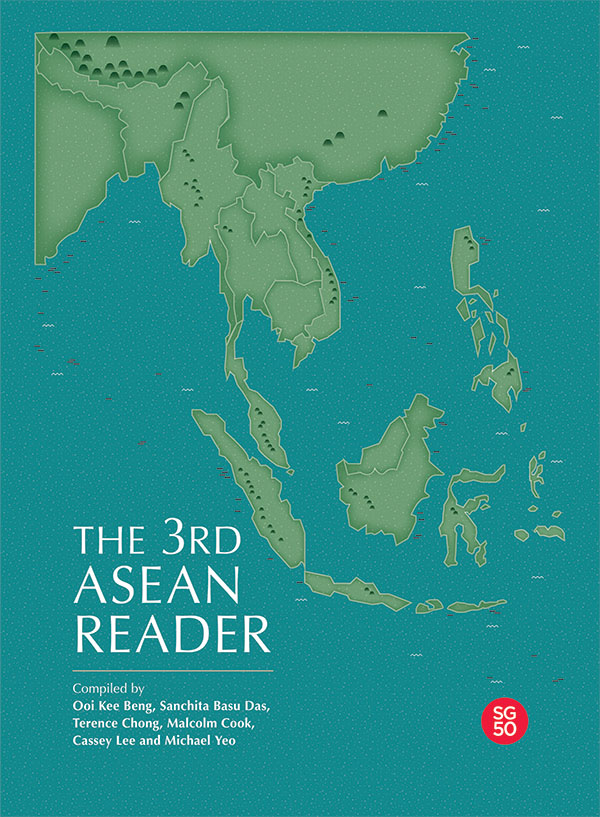Book contents
- Frontmatter
- Contents
- Preface
- Forewords to the First and Second ASEAN Reader: ASEAN: Conception and Evolution
- Forewords to the First and Second ASEAN Reader: ASEAN: The Way Ahead
- Forewords to the First and Second ASEAN Reader: New Challenges for ASEAN
- SECTION I ASEAN: THE LONG VIEW
- SECTION II COUNTRY ANALYSES
- SECTION III COMPARATIVE ANALYSES OF THE REGION
- Southeast Asian Societies
- The Southeast Asian Economy
- Southeast Asian Politics
- SECTION IV INTERNATIONAL DEVELOPMENTS
- SECTION V INSTITUTIONS OF ASEAN
- SECTION VI ASSESSING ASEAN'S INTERNAL POLICIES
- ASEAN Political Security Community
- ASEAN Economic Community
- 41 Implementing the ASEAN Economic Community Blueprint
- 42 Towards an ASEAN Economic Community by 2015
- 43 Understanding ASEAN's Connectivity
- 44 Enhancing the Institutional Framework for AEC Implementation
- 45 What is a Single Market? An Application to the Case of ASEAN
- 46 Non-Tariff Barriers: A Challenge to Achieving the ASEAN Economic Community
- 47 Towards a Truly Seamless Single Windows and Trade Facilitation Regime in ASEAN Beyond 2015
- 48 An Assessment of Services Sector Liberalization in ASEAN
- 49 Financial Integration Challenges in ASEAN beyond 2015
- 50 Free Flow of Skilled Labour in ASEAN
- 51 Toward a Single Aviation Market in ASEAN: Regulatory Reform and Industry Challenges
- ASEAN Socio-Cultural Community
- SECTION VII ASSESSING ASEAN'S EXTERNAL INITIATIVES
- ASEAN Processes
- ASEAN's Major Power Relations
- SECTION VIII SOUTHEAST ASIA: PERIPHERAL NO MORE
- Bibliography
- The Contributors
- The Compilers
48 - An Assessment of Services Sector Liberalization in ASEAN
from ASEAN Economic Community
Published online by Cambridge University Press: 22 June 2017
- Frontmatter
- Contents
- Preface
- Forewords to the First and Second ASEAN Reader: ASEAN: Conception and Evolution
- Forewords to the First and Second ASEAN Reader: ASEAN: The Way Ahead
- Forewords to the First and Second ASEAN Reader: New Challenges for ASEAN
- SECTION I ASEAN: THE LONG VIEW
- SECTION II COUNTRY ANALYSES
- SECTION III COMPARATIVE ANALYSES OF THE REGION
- Southeast Asian Societies
- The Southeast Asian Economy
- Southeast Asian Politics
- SECTION IV INTERNATIONAL DEVELOPMENTS
- SECTION V INSTITUTIONS OF ASEAN
- SECTION VI ASSESSING ASEAN'S INTERNAL POLICIES
- ASEAN Political Security Community
- ASEAN Economic Community
- 41 Implementing the ASEAN Economic Community Blueprint
- 42 Towards an ASEAN Economic Community by 2015
- 43 Understanding ASEAN's Connectivity
- 44 Enhancing the Institutional Framework for AEC Implementation
- 45 What is a Single Market? An Application to the Case of ASEAN
- 46 Non-Tariff Barriers: A Challenge to Achieving the ASEAN Economic Community
- 47 Towards a Truly Seamless Single Windows and Trade Facilitation Regime in ASEAN Beyond 2015
- 48 An Assessment of Services Sector Liberalization in ASEAN
- 49 Financial Integration Challenges in ASEAN beyond 2015
- 50 Free Flow of Skilled Labour in ASEAN
- 51 Toward a Single Aviation Market in ASEAN: Regulatory Reform and Industry Challenges
- ASEAN Socio-Cultural Community
- SECTION VII ASSESSING ASEAN'S EXTERNAL INITIATIVES
- ASEAN Processes
- ASEAN's Major Power Relations
- SECTION VIII SOUTHEAST ASIA: PERIPHERAL NO MORE
- Bibliography
- The Contributors
- The Compilers
Summary
INTRODUCTION
ASEAN has made a remarkable achievement in liberalizing trade in goods. The progress made in liberalizing trade in services, however, has not been as impressive. Liberalization efforts in services in the past have been focused on two areas: the promotion of trade services by using the GATS approach of request and offer of liberalization by services sector and the promotion of flows of skilled labour through the establishment of Mutual Recognition Arrangements (MRAs) of professional services.
ASEAN FRAMEWORK AGREEMENT IN SERVICES
ASEAN has completed seven packages of commitments to liberalize services trade thus far. But negotiations for the past fifteen years have resulted only in marginal liberalization of trade in services in ASEAN.
Lim (2008) quantified commitments made in AFAS compared to those made in the GATS. Table 1 illustrates the Sectoral Coverage Ratio (SCR) of AFAS commitments. SCR is defined as the ratio of GATS + AFAS sectoral coverage in the numerator and the GATS sectoral coverage in the denominator. That is, the larger the ratio, the more advanced are commitments made in the AFAS as compared with those made in the GATS. The minimum ratio, which is one, indicates that concessions made in the regional forum under the AFAS are not any more advanced than those made in the multilateral forum under the GATS.
As can be seen, except for Brunei, Myanmar and the Philippines, the SCR figures for member countries are marginally greater than one. The low SCR scores for Cambodia and Vietnam, however, can be explained by their already advanced liberalization commitments made in WTO (due to their relatively late accession) rather than their unwillingness to open up their services sector at the regional level. Table 1 shows quantitative indicators of individual ASEAN country's GATS commitments index. As mentioned earlier, Cambodia and Vietnam obtain the highest scores of 49.08 and 30.15, respectively. Brunei and Myanmar made very little concession in the GATS, while larger ASEAN economies such as Indonesia, the Philippines, Thailand, Malaysia, and Singapore, receive scores that range from the lowest at 9.52 for Indonesia to highest at 25.4 for Malaysia. For these countries, barring the Philippines, AFAS commitments are only marginal to those made in the WTO as the SCR figures are between 1.09 for Singapore and 1.56 for Indonesia. ASEAN's average SCR score is only 1.58.
- Type
- Chapter
- Information
- The 3rd ASEAN Reader , pp. 251 - 255Publisher: ISEAS–Yusof Ishak InstitutePrint publication year: 2015



